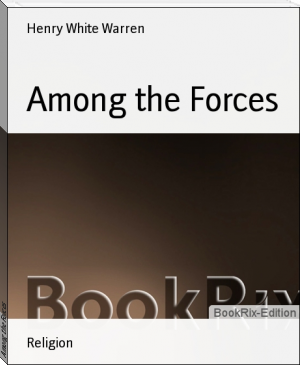Among the Forces by Henry White Warren (no david read aloud .TXT) 📖

Download in Format:
- Author: Henry White Warren
Book online «Among the Forces by Henry White Warren (no david read aloud .TXT) 📖». Author Henry White Warren
that is unsunderable. But the wails of separation have filled the air since Eve shrieked over Abel. Husbands and fathers are ever crying:
Immortal? I feel it and know it.
Who doubts of such as she?
But that's the pang's very essence,
Immortal away from me.
But there, in finer realms, shall be a knitting of severed friendships up to be sundered no more forever.
Specially has man sought in this stage of being to know God. Job, in his pain and loss, assailed by the cruel rebukes of his friends and desolate by the desertion of his wife, says, "O that I knew where I might find him." David cries out while his tears are flowing day and night, "As the hart panteth after the water brooks, so panteth my soul after thee, O God. My soul thirsteth for God, for the living God: when shall I come and appear before God?" Moses, in the broadest of visions, material, historic, prophetic, says to God, "Show me thy glory." And common men have always turned the high places of earth to altar piles, and blackened the heavens with the smoke of their sacrifices. But the means of knowing God are to be increased. The very essence of life eternal is to know the true God, and Jesus Christ whom he has sent. Great pains have been taken to manifest forth God to dull senses and to oxlike thoughts here; greater pains, with better results, shall be taken there. Every reader of the Apocalypse notices with joy, if not rapture, that when the book that was sealed with seven seals, which no man in heaven, nor earth, was able to reveal, nor open, nor even look upon, was finally opened by the Lamb, and its marvelous panoramas, charades, and symbolic significances had to be carefully explained to John, the man best able of any to understand them--we observe with rapture that the regular inhabitants of that hitherto unseen world understood all at once, and broke into shouts like the sound of these many waters in a storm. Above all these superior manifestations in finer realms the pure in heart shall _see_ God.
III. But there is in space what there was before the world began. Philosophy asserts that the invisible universe is a perfect fluid in which not even atoms exist, and atoms are produced therefrom by the First Great Cause by creation, not by development. This conception is full of difficulties to thought. We cannot even agree whether creation was in time or eternity. But all agree in this, that the invisible is rapidly absorbing all the force at least of the visible universe, and that when force is gone the corpse will not remain unburied. Indeed, when the range of seeing puts the size of an atom at less than one two-hundred-and-twenty-four-thousandth of an inch, and when the range of thinking puts it at less than one six-millionth of an inch, many prefer to consider an atom as a center of force and not as a material entity at all. But, amid uncertainties, this is certain, that the forces of the visible worlds are extraneous. They come out of the invisible. They are all also returning to the invisible; that is what light is doing in space, previously referred to. This incredibly high-class energy is not banking up coal in the celestial ether as it did on the earth, but is returning to the quick, mobile forces of the invisible worlds. One thing more is certain, that the origin of all the forces of the invisible is in personality; for the atom, it is agreed, bears all the marks of being a manufactured article. Different-sized shot could not have greater uniformity of structure and constitution. And their whole behavior shows that they are controlled by an admirable wisdom past finding out.
That these forces exist and are necessarily active there are three proofs. Worlds have been made, not of things and forces that do appear. They were abundantly displayed in the physical miracles of Christ and others; and these forces, independently of the physical miracles at various times, have continuously helped men.
(1) Concerning the first fact--that worlds have been made--nothing need be said except that these forces, being personal, cannot be supposed to be exhausted, and hence creations can go on continuously. We are assured that they do. And the personal element more and more relates itself to personalities. "I go to prepare a place for you," to fit up a mansion according to tastes, needs, and enjoyments of the future occupant.
(2) This is the place to assert, not to prove, that this visible world has always been subject to the forces of the invisible world. It does not matter whether these forces are personal or personally directed. Its waters divide, gravitation at that point being overcome; they harden for a path, or bodies are levitated; they burn by a fire as fierce as that which plays between two electric poles. These forces are not the ordinary endowments of matter; they step out of the realm of the greater invisible, execute their mission, and, like an angel's sudden appearance, disappear. Who knows how frequently they come? We, for whose sake all nature stands "and stars their courses move," may need more frequent motherly attentions than the infant knows of. They will not be lacking, even if not sufficiently evident to the infant to be cried for. "Your heavenly Father knoweth that ye have need of all these things."
(3) It is here designed to be asserted that the forces of the invisible seek to be continually in full play on the intellectual and moral natures of man. Our unique Christian Scriptures have this thought for their whole significance. It begins with God's walking with Adam in the garden, and goes on till it is said, "Come, ye blessed of my Father, inherit the kingdom prepared for you," in the invisible, and by the invisible, from before the foundation of the visible world. It includes all time and opportunity between and after; we need specify only to intensify the conception of the fact. Paul says, "Having therefore obtained help of God, I continue unto this day," when otherwise oppressive circumstances and hate of men seeking to kill him would have prevented his continuing in life. It is possible for all who believe to be given power, out of the invisible, to become sons of God. It has been said that there is power and continuousness enough in
the tides, winds, rotating and revolving worlds for man to make a machine for perpetual motion. The only difficulty is to belt on. The great object of life in the visible should be to belt on to the invisible. Our great Example who did this made his ordinary doing better than common men's best, his parentheses of thought richer than other men's paragraphs and volumes. And he left on record for us promises of greater works than these, at which we stagger through unbelief. We should not; for men who have lived by the evidence of things not seen, and sought a city that received Jesus out of sight, have found that "God is not ashamed to be called their God." They have wrought marvels that men tell over like a rosary of what is possible to men. It is beyond the belief of all who have not been touched by the power of an endless life. But what they do is chiefly valuable as evidence of what they are. It is little that men quench the violence of fire, and receive their dead raised to life again. It is great that they are able to do it. That they hold the hand that holds the world is something. But that they have eyes to see, a wisdom to choose, and will to execute the best, is more. Fire may kindle again and the resurrected die, but the great personality survives.
These forces are not discontinuous, connected with this temporary world, and liable to cease when it fails. They belong to the permanent, invisible order of things. Suppose one loses his body. Then there is no force whereby earth can hold its child any longer to its breast. It flies on at terrific speed, dwindling to a speck in unknown distances, and leaving the man amid infinitudes alone. But there are other attractions. There was One uplifted on a cross to draw all men unto him. Love has finer attraction for souls than gravitation has for bodies.
Then all his being thrills with Joy. And past
The comets' sweep, the choral stars above,
With multiplying raptures drawn more swift
He flies into the very heart of love.
It is hoped that the object of this writing is accomplished--to widen our view of the great principle of continuity in the universe. It is not sought to dwarf the earth, but to fit it rightly into its place as a part of a great whole. It is better for a state to be a part of a glorious union than to be independent; better for a man to belong to the entirety of creation than to be Robinson Crusoe on his island. We belong to more than this earth. It is not of the greatest importance whether we lose it or it lose itself. We look for a "new heavens and a new earth." We are, or should be, used to their forces, and at home among their personalities. This universe is a unity. It is not made up of separate, catastrophic movements, but it all flows on like the sweetly blended notes of a psalm. "Therefore will not we fear, though the earth be removed, and though the mountains be carried into the midst of the sea;" though the heavens be "rolled together as a scroll," the stars fall, "even as a fig tree casteth her untimely figs," when it is shaken with the wind, and though our bodies are whelmed in the removal of things that can be shaken. For even then we may find the calm force that shakes the earth is the force that is from everlasting to everlasting; may find that it is personal and loving. It says, "Lo, it is I; be not afraid."
Whatever comes, whether one sail the spaces in the great ship we call the world, or fall overboard into Mississippis and Amazons of power in which worlds are mere drifting islands, he will be at peace and at home anywhere. He will ever say:
"The winds that o'er my ocean run
Blow from all worlds, beyond the sun;
Through life, through death, through faith, through time,
Great breaths of God, they sweep sublime,
Eternal trades that cannot veer,
And blowing, teach us how to steer;
And well for him whose joy, whose care,
Is but to keep before them fair.
"O thou, God's mariner, heart of mine,
Spread canvas to these airs divine.
Spread sail and let thy past life be
Forgotten in thy destiny."
[1]The action that drives off the material of a
Immortal? I feel it and know it.
Who doubts of such as she?
But that's the pang's very essence,
Immortal away from me.
But there, in finer realms, shall be a knitting of severed friendships up to be sundered no more forever.
Specially has man sought in this stage of being to know God. Job, in his pain and loss, assailed by the cruel rebukes of his friends and desolate by the desertion of his wife, says, "O that I knew where I might find him." David cries out while his tears are flowing day and night, "As the hart panteth after the water brooks, so panteth my soul after thee, O God. My soul thirsteth for God, for the living God: when shall I come and appear before God?" Moses, in the broadest of visions, material, historic, prophetic, says to God, "Show me thy glory." And common men have always turned the high places of earth to altar piles, and blackened the heavens with the smoke of their sacrifices. But the means of knowing God are to be increased. The very essence of life eternal is to know the true God, and Jesus Christ whom he has sent. Great pains have been taken to manifest forth God to dull senses and to oxlike thoughts here; greater pains, with better results, shall be taken there. Every reader of the Apocalypse notices with joy, if not rapture, that when the book that was sealed with seven seals, which no man in heaven, nor earth, was able to reveal, nor open, nor even look upon, was finally opened by the Lamb, and its marvelous panoramas, charades, and symbolic significances had to be carefully explained to John, the man best able of any to understand them--we observe with rapture that the regular inhabitants of that hitherto unseen world understood all at once, and broke into shouts like the sound of these many waters in a storm. Above all these superior manifestations in finer realms the pure in heart shall _see_ God.
III. But there is in space what there was before the world began. Philosophy asserts that the invisible universe is a perfect fluid in which not even atoms exist, and atoms are produced therefrom by the First Great Cause by creation, not by development. This conception is full of difficulties to thought. We cannot even agree whether creation was in time or eternity. But all agree in this, that the invisible is rapidly absorbing all the force at least of the visible universe, and that when force is gone the corpse will not remain unburied. Indeed, when the range of seeing puts the size of an atom at less than one two-hundred-and-twenty-four-thousandth of an inch, and when the range of thinking puts it at less than one six-millionth of an inch, many prefer to consider an atom as a center of force and not as a material entity at all. But, amid uncertainties, this is certain, that the forces of the visible worlds are extraneous. They come out of the invisible. They are all also returning to the invisible; that is what light is doing in space, previously referred to. This incredibly high-class energy is not banking up coal in the celestial ether as it did on the earth, but is returning to the quick, mobile forces of the invisible worlds. One thing more is certain, that the origin of all the forces of the invisible is in personality; for the atom, it is agreed, bears all the marks of being a manufactured article. Different-sized shot could not have greater uniformity of structure and constitution. And their whole behavior shows that they are controlled by an admirable wisdom past finding out.
That these forces exist and are necessarily active there are three proofs. Worlds have been made, not of things and forces that do appear. They were abundantly displayed in the physical miracles of Christ and others; and these forces, independently of the physical miracles at various times, have continuously helped men.
(1) Concerning the first fact--that worlds have been made--nothing need be said except that these forces, being personal, cannot be supposed to be exhausted, and hence creations can go on continuously. We are assured that they do. And the personal element more and more relates itself to personalities. "I go to prepare a place for you," to fit up a mansion according to tastes, needs, and enjoyments of the future occupant.
(2) This is the place to assert, not to prove, that this visible world has always been subject to the forces of the invisible world. It does not matter whether these forces are personal or personally directed. Its waters divide, gravitation at that point being overcome; they harden for a path, or bodies are levitated; they burn by a fire as fierce as that which plays between two electric poles. These forces are not the ordinary endowments of matter; they step out of the realm of the greater invisible, execute their mission, and, like an angel's sudden appearance, disappear. Who knows how frequently they come? We, for whose sake all nature stands "and stars their courses move," may need more frequent motherly attentions than the infant knows of. They will not be lacking, even if not sufficiently evident to the infant to be cried for. "Your heavenly Father knoweth that ye have need of all these things."
(3) It is here designed to be asserted that the forces of the invisible seek to be continually in full play on the intellectual and moral natures of man. Our unique Christian Scriptures have this thought for their whole significance. It begins with God's walking with Adam in the garden, and goes on till it is said, "Come, ye blessed of my Father, inherit the kingdom prepared for you," in the invisible, and by the invisible, from before the foundation of the visible world. It includes all time and opportunity between and after; we need specify only to intensify the conception of the fact. Paul says, "Having therefore obtained help of God, I continue unto this day," when otherwise oppressive circumstances and hate of men seeking to kill him would have prevented his continuing in life. It is possible for all who believe to be given power, out of the invisible, to become sons of God. It has been said that there is power and continuousness enough in
the tides, winds, rotating and revolving worlds for man to make a machine for perpetual motion. The only difficulty is to belt on. The great object of life in the visible should be to belt on to the invisible. Our great Example who did this made his ordinary doing better than common men's best, his parentheses of thought richer than other men's paragraphs and volumes. And he left on record for us promises of greater works than these, at which we stagger through unbelief. We should not; for men who have lived by the evidence of things not seen, and sought a city that received Jesus out of sight, have found that "God is not ashamed to be called their God." They have wrought marvels that men tell over like a rosary of what is possible to men. It is beyond the belief of all who have not been touched by the power of an endless life. But what they do is chiefly valuable as evidence of what they are. It is little that men quench the violence of fire, and receive their dead raised to life again. It is great that they are able to do it. That they hold the hand that holds the world is something. But that they have eyes to see, a wisdom to choose, and will to execute the best, is more. Fire may kindle again and the resurrected die, but the great personality survives.
These forces are not discontinuous, connected with this temporary world, and liable to cease when it fails. They belong to the permanent, invisible order of things. Suppose one loses his body. Then there is no force whereby earth can hold its child any longer to its breast. It flies on at terrific speed, dwindling to a speck in unknown distances, and leaving the man amid infinitudes alone. But there are other attractions. There was One uplifted on a cross to draw all men unto him. Love has finer attraction for souls than gravitation has for bodies.
Then all his being thrills with Joy. And past
The comets' sweep, the choral stars above,
With multiplying raptures drawn more swift
He flies into the very heart of love.
It is hoped that the object of this writing is accomplished--to widen our view of the great principle of continuity in the universe. It is not sought to dwarf the earth, but to fit it rightly into its place as a part of a great whole. It is better for a state to be a part of a glorious union than to be independent; better for a man to belong to the entirety of creation than to be Robinson Crusoe on his island. We belong to more than this earth. It is not of the greatest importance whether we lose it or it lose itself. We look for a "new heavens and a new earth." We are, or should be, used to their forces, and at home among their personalities. This universe is a unity. It is not made up of separate, catastrophic movements, but it all flows on like the sweetly blended notes of a psalm. "Therefore will not we fear, though the earth be removed, and though the mountains be carried into the midst of the sea;" though the heavens be "rolled together as a scroll," the stars fall, "even as a fig tree casteth her untimely figs," when it is shaken with the wind, and though our bodies are whelmed in the removal of things that can be shaken. For even then we may find the calm force that shakes the earth is the force that is from everlasting to everlasting; may find that it is personal and loving. It says, "Lo, it is I; be not afraid."
Whatever comes, whether one sail the spaces in the great ship we call the world, or fall overboard into Mississippis and Amazons of power in which worlds are mere drifting islands, he will be at peace and at home anywhere. He will ever say:
"The winds that o'er my ocean run
Blow from all worlds, beyond the sun;
Through life, through death, through faith, through time,
Great breaths of God, they sweep sublime,
Eternal trades that cannot veer,
And blowing, teach us how to steer;
And well for him whose joy, whose care,
Is but to keep before them fair.
"O thou, God's mariner, heart of mine,
Spread canvas to these airs divine.
Spread sail and let thy past life be
Forgotten in thy destiny."
[1]The action that drives off the material of a
Free ebook «Among the Forces by Henry White Warren (no david read aloud .TXT) 📖» - read online now
Similar e-books:





Comments (0)